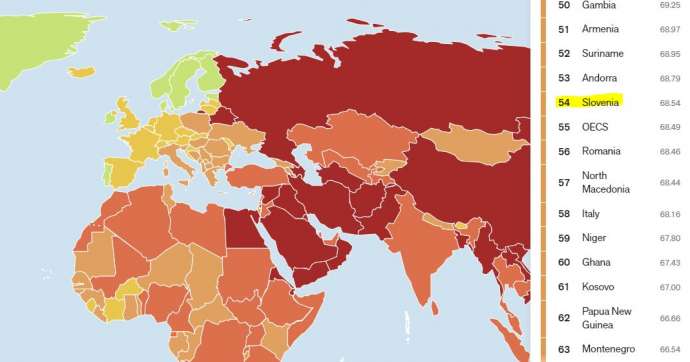STA, 3 May 2022 - Slovenia's human rights ombudsman and journalist organisations have urged action to address deteriorating press freedom in the country after Slovenia slid 18 spots to 54th in the latest World Press Freedom Index, the worst yet since Reporters Without Borders started compiling the ranking.
Ombudsman Peter Svetina says it is the authorities' duty to create a climate conducive to media freedom, and expects a suitable legal framework to be put in place to guarantee media freedom, ownership transparency and a ban on dissemination of hate speech in the media.
"For several years, we have been calling for amendments to the media act to provide for ways to protect the public interest, measures to remove illegal content or hate speech, and sanctions on media outlets that condone such speech. It is important the damages awarded are high enough to deter the media from publishing increasingly sensationalist and populist stories," Svetina wrote.
He urged decriminalising defamation, which being a criminal offence he sees as a threat to media freedom. Journalists are often targets of online harassment, and there are increasing reports of strategic lawsuits against journalists.
The ombudsman expects the new government to take on changes to the media law as a priority. "I expect the Slovenian Press Agency (STA) and the public broadcasting service [RTV Slovenija], which usually fall hostage to the winners of each election, to be able to work autonomously and without disruption."
The ombudsman also called for steps to make media advertising by national and local governments more transparent, saying the European Commission's noted the country's lack of transparent principles on the payment of media content, in particular at the local level. One problem is state-owned enterprises invoking business secrecy over those data.
The ombudsman also raised precarisation of journalism as another threat to media freedom, urging the state to find appropriate normative solutions to limit the problem.
Calls to change media law and in particular the act on the public broadcasting service have also come from journalist organisations and the NGO Legal Network is working with media experts on a new bill on RTV Slovenija.
The Slovenian Journalists' Association (DNS) noted that RTV Slovenija became the next target of the outgoing government after the STA showed it could not be pressured into submission, also with the help of crowdfunding launched a year ago.
Even though the DNS is not in favour of unsystematic changes to media legislation, they believe urgent action is needed to depoliticise RTV Slovenija and stop the decline in trust and professional standards and to allow the public media to function normally.
Their goal until next World Press Freedom Day will be to reform media legislation in a bid to create a systemic framework for successful functioning of the media in the country. "To do this, we need competent leadership and a team at the Media Directorate [at the Culture Ministry]," the DNS said, adding they expected the new government to deliver on those promises.
"Traditional media are finding it increasingly difficult to fund content that is not just click-bait. Politics, especially the incumbent ruling party, wanted journalists to be loyal political propagandists, and smeared those who refused to cooperate in every possible way," the DNS summed up how it sees the media situation in the country.
Jernej Amon Prodnik of the Ljubljana Faculty of Social Sciences, the main journalism school in Slovenia, sees the decline in the country's press freedom ranking as a result of attacks on journalists and in demolition of the media space taken on systematically by the Janez Janša government when it assumed power in 2020.
"We have never seen such brutal attacks or political appointments of completely incompetent people in Slovenia, even though politics had tried to influence the media before," he said, adding that attacks on and interference in the media are a feature of authoritarian politics worldwide where Slovenia was no exception.
As a key measure to tackle the situation, Amon Prodnik underscored a reform of media law, along with self-restraint exercised by politics. Slovenia's legislation is completely outdated, which in the case of RTV Slovenija act "apparently makes it possible to stage a complete political takeover of a public service".
The leaders of the three parties that are in talks to form the next government reiterated today that tackling media legislation to ensure media freedom would be one of the first priorities of the next government.
Luka Mesec, the leader of the Left, said they had already talked about a media law as one of the first that needed changing and they had solutions ready for the RTV Slovenija act, with Social Democrat leader Tanja Fajon adding the goal was to remove politics from the bodies running RTV Slovenija.
Robert Golob, the leader of the Freedom Movement, the party that won the election, said the slide on the World Press Freedom Index was but one of the signs it was high time to change government "and one of the easier goals for us to make better. We'll need to do that quickly."
PM Janez Janša commented on Twitter, asserting the situation in the Slovenian media space "is much worse still than what various media organisations are finding". He said Reporters Without Borders were not aware of the strong links the left bloc had to the media, noting that "editors and relatives" of the news portal 24ur.com and RTV Slovenija "stood on the tickets of left parties" in the 24 April election.






